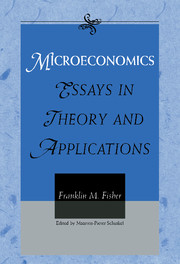Book contents
- Frontmatter
- Contents
- Introduction
- Part I Disequilibrium and Stability
- 1 The Formation of Economic Magnitudes: Disequilibrium and Stability (1990)
- 2 Quasi-Competitive Price Adjustment by Individual Firms: A Preliminary Paper (1970)
- 3 Stability and Competitive Equilibrium in Two Models of Search and Individual Price Adjustment (1973)
- 4 On Price Adjustment without an Auctioneer (1972)
- 5 Quantity Constraints, Spillovers, and the Hahn Process (1978)
- 6 On Stability Analysis with Disequilibrium Awareness (1988)
- 7 It Takes t* to Tango: Trading Coalitions with Fixed Prices (1989)
- 8 An Alternate Proof and Extension of Solow's Theorem on Nonnegative Square Matrices (1962)
- 9 Choice of Units, Column Sums, and Stability in Linear Dynamic Systems with Nonnegative Square Matrices (1965)
- 10 A Simple Proof of the Fisher–Fuller Theorem (1972)
- 11 Gross Substitutes and the Utility Function (1972)
- Part II Welfare Economics and Consumer Theory
- Part III Applications of Microeconomic Theory
- Part IV Industrial Organization, Economics, and the Law
- Part V Public Policy Applications
- Epilogue
- Indexes
9 - Choice of Units, Column Sums, and Stability in Linear Dynamic Systems with Nonnegative Square Matrices (1965)
Published online by Cambridge University Press: 20 March 2010
- Frontmatter
- Contents
- Introduction
- Part I Disequilibrium and Stability
- 1 The Formation of Economic Magnitudes: Disequilibrium and Stability (1990)
- 2 Quasi-Competitive Price Adjustment by Individual Firms: A Preliminary Paper (1970)
- 3 Stability and Competitive Equilibrium in Two Models of Search and Individual Price Adjustment (1973)
- 4 On Price Adjustment without an Auctioneer (1972)
- 5 Quantity Constraints, Spillovers, and the Hahn Process (1978)
- 6 On Stability Analysis with Disequilibrium Awareness (1988)
- 7 It Takes t* to Tango: Trading Coalitions with Fixed Prices (1989)
- 8 An Alternate Proof and Extension of Solow's Theorem on Nonnegative Square Matrices (1962)
- 9 Choice of Units, Column Sums, and Stability in Linear Dynamic Systems with Nonnegative Square Matrices (1965)
- 10 A Simple Proof of the Fisher–Fuller Theorem (1972)
- 11 Gross Substitutes and the Utility Function (1972)
- Part II Welfare Economics and Consumer Theory
- Part III Applications of Microeconomic Theory
- Part IV Industrial Organization, Economics, and the Law
- Part V Public Policy Applications
- Epilogue
- Indexes
Summary
Sufficiency conditions for the stability of a nonnegative square matrix in terms of the column or row sums thereof are, of course, well known. Such conditions are not also necessary. If such a matrix is that of a dynamic system, however, the non-zero off-diagonal elements thereof are not independent of the units in which the variables are measured, and the same statement holds for the column or row sums. This paper sets out results related to the existence of a set of units in which the Solow condition on column sums holds. The basic mathematical results are already known, but it seems useful to draw them together in one place and to give them an interpretation in terms of units.
The basic theorem for first-order systems is that if the matrix is indecomposable, there exists a set of units in which all column sums are equal to the Frobenius root. This is an interpretation of a theorem of Kolmogorov. The theorem immediately implies the necessity of the existence of a set of units for which the Solow condition holds. In addition, we observe that there are alternate simple ways of proving the latter result, one of which allows us to interpret a result of McKenzie (1960), as the latter author did not do.
If the original dynamic system is of an order higher than first, then the construction used in the proof of the results just described leads to the use of different units for the same variable in different time periods.
- Type
- Chapter
- Information
- MicroeconomicsEssays in Theory and Applications, pp. 163 - 169Publisher: Cambridge University PressPrint publication year: 1999



